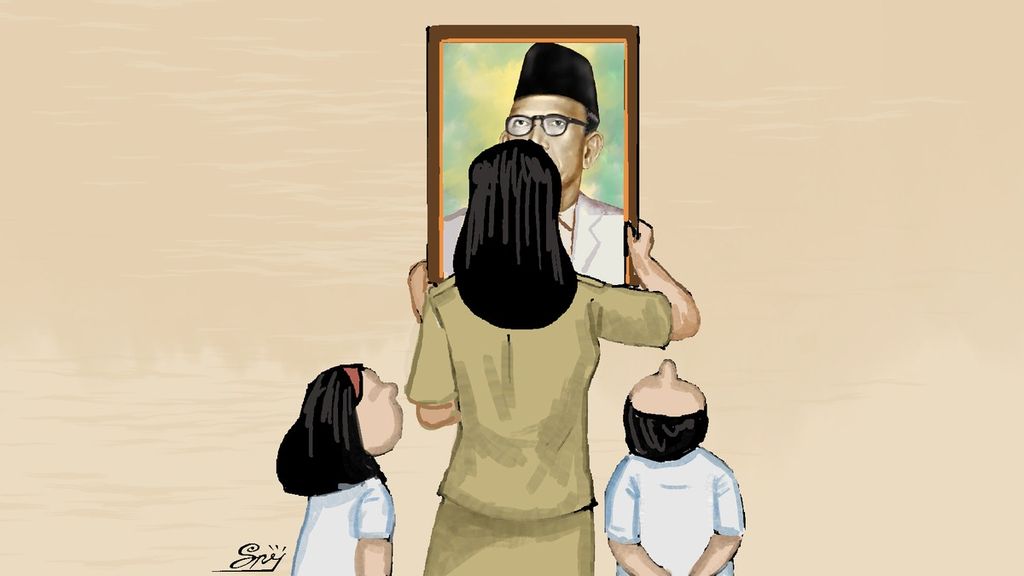The root of various controversies and commotions related to the presidential and legislative elections, which have never happened before in this country, if looked back from the perspective of Tamansiswa, is a reflection of the failure of our national education system to educate Indonesian people with noble character, ethics, and graceful morality as outlined by Ki Hadjar.
Also read: A Century of Student Parks Guards the Direction of National Education
As a result, chaos ensues in society. Dishonesty, falsehood, and injustice are normalized. Truth, honesty, and justice are no longer valued. Indonesia has become a “theater state” that is a shameful spotlight of the international community.
The educational foundation taught by Ki Hadjar prioritizes character education to avoid the Tri Pantangan (prohibition of abusing authority, violating financial order, and violating morality).
Indonesia’s good governance (good governance) has faded, no longer able to organize a strong Leadership Trilogy:ing ngarso sung tulada, ing madya mangun karsa, tut wuri handayani. In this way, the teachings of student affairs to live in an orderly, peaceful, peaceful and happy manner are no longer a reference for living together.
Educational information
In November 1928, Ki Hadjar issued an education proclamation highlighting the importance of conducting education and teaching based on national ideology: “…Teaching must have a national character…. If education for children is not based on nationalism, they will not develop a love for their country and eventually become estranged from their nation, possibly even becoming our enemy…”.
Tamansiswa can feel involved in establishing the country of Indonesia. Ki Hadjar was a member of the Committee for Investigating Preparatory Work for Independence (BPUPK) and later became a member of the Indonesian Independence Preparation Committee (PPKI). As a member of PPKI, Ki Hadjar participated in the ratification of the 1945 Constitution. Therefore, Tamansiswa people always realize their noble duty, which is to take care of the Republic of Indonesia.
Ki Hadjar also played a role in formulating Article 31 of the 1945 Constitution, which at that time was supported by a team consisting of tough intellectual figures, namely Prof. Hoesain Djajadiningrat, Prof. Asikin, Prof. Rooseno, Ki Bagoes Hadikoesoemo, and Kiai Hadji Masjkoer. What is remarkable about the formulation of Article 31 of the 1945 Constitution is its second paragraph, which states: “The government strives for and organizes a national education system…”.
“The national education system” is truly in accordance with the demands of our Indonesian identity, where its citizens consist of diverse children of the nation (from different ethnicities, cultures, customs, and traditions).
Without knowing the history of the nation’s struggle, we will lose our national identity.
With this “one system” of national education, the diverse citizens of this nation can be transformed into a unified entity – one in their way of thinking about Indonesian identity, one in their worldview, and in turn, form a sense of togetherness, family, and a united heart on a national level.
Unity in the beautiful diversity is the foundation for serving our Motherland, with a basis of nationalism and Indonesian identity.
More than that, Ki Hadjar also formulated Article 32, the contents of which are: “The government promotes national culture”.
This formulation is very accurate. The culture of the nation as formulated by Ki Hadjar is “culture that arises as a result of the cultural efforts of all Indonesians. Efforts towards cultural progress must lead towards refinement and cultural advancement without rejecting new elements from foreign cultures that can develop and enrich our own national culture. In essence, we are striving to elevate the level of humanity for the Indonesian nation.”
That’s where we see Ki Hadjar as a complete humanist with a broad view of our future.
character
We need to strive for the reinstatement of teaching in Indonesia that prioritizes the formation of noble character. We must highly respect our teachers in their honored position, which is through their ability to produce high-character and high-integrity children of the nation.
Whose nature of thought and actions are also guided by the values of humanitarianism literary opponent ngesti mulya (with knowledge we aspire to happiness and prosperity), holy system of single ngesti ( with pure hearts we aspire to perfection), and those with the personality of ngandel-kendel-bandel-kandel (trust in God, brave, determined, self-confident).
Once again, Ki Hadjar participated in the establishment of the Republic of Indonesia, so Tamansiswa must also feel that they have helped to establish the Republic of Indonesia. Therefore, Tamansiswa is obliged to together take care of the Republic of Indonesia as best as possible, and not neglect the symptoms of national disintegration.
Thus, our educated people must be able to accompany the government to fill in Article 31 Paragraph 2 and act ascurriculum leaders.
As a member of the PPKI, Ki Hadjar was involved in the ratification of the 1945 Constitution. Therefore, the people of Tamansiswa always realize their noble duty, which is to help preserve the Republic of Indonesia.
We must prepare ourselves to build the future of Indonesia, and not let subjects such as morals, history, earth science, and Indonesian language be neglected in the classroom.
Without knowing the history of the nation’s struggle, we will lose the national identity. Without earth science, we will not know our very rich homeland. Without history and earth science, we will not be able to position ourselves accurately in this global life.
Sri-Edi Swasono, General Chairman of the Tamansiswa Supreme Council
